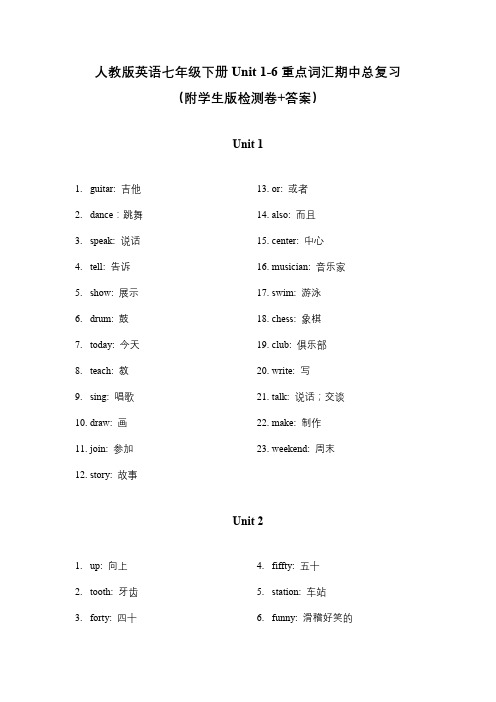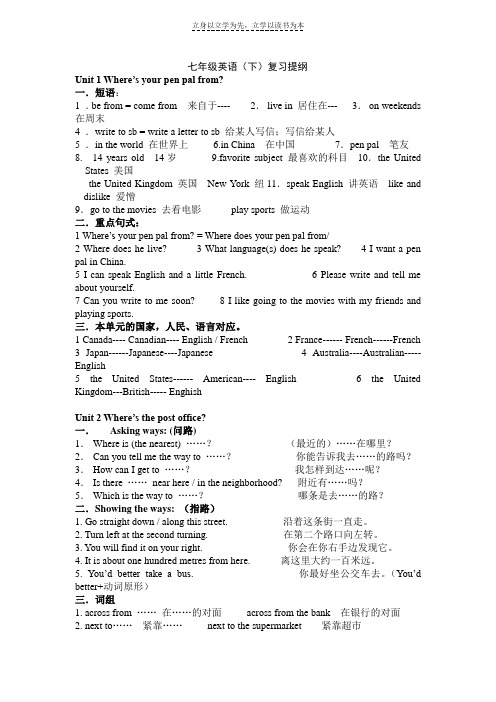人教版七年级英语下册期中复习资料全
人教版七年级下册英语期中复习

人教版七年级下册英语期中复习Unit 1 Can you play the guitar?XXX "can":Can" can be used to express ability。
such as "He can speak English very well" or "She can sing some English songs." It can also be used to express n。
such as "You can play the lin after school every day" or "Students can't take cell phones or Mp3 players to school." "Can" can also be used to make a polite request。
with "Could you help me with my English?" being an example。
"Can't" is the negative form of "can," and can be used to express impossibility。
such as "That can't be him。
He is in New York now."Negative and interrogative forms:To form the negative form of a modal verb like "can," simply add "not" after the verb。
人教版英语七年级下册期中知识点归纳

人教版英语七年级下册期中知识点归纳一、词汇1.1. 几个常用短语和表达•What’s the matter? 什么事情?•be late for 上课迟到•in front of 在……前面•next to 在……旁边•go straight 直走•turn left 向左转•turn right 向右转1.2. 单词下面是本单元重点单词:1.afraid 害怕的2.angry 生气的3.arrive 到达4.busy 忙碌的5.grade 年级6.important 重要的7.library 图书馆8.relax 放松9.restroom 停车场10.shopping 购物二、语法2.1. 现在进行时现在进行时表示现在正在进行或发生的动作,用来描述当前正在进行的事情。
其结构为“主语+be(am, is, are)+v. -ing”。
举个例子:I am reading a book now.2.2. 一般现在时一般现在时表示现在的动作或状态。
其结构为“主语+v. / does not (doesn’t) + v.”。
当主语为he, she, it时,需在动词后加-s。
举个例子:He often goes to school by bike.2.3. 句型•What are you doing? I am reading a book. 你在干什么?我在看书。
•Where is the restroom? 地下停车场在哪里?•When are you going to Beijing? 你什么时候去北京?三、阅读理解3.1. 阅读短文下面是一篇关于乔治的短文,请仔细阅读。
George is a student. He is in Grade Seven. He is busy every day. He gets up early and goes to school by bike. He has three classes in the morning. Then he has lunch at school. He likes to eat beef and rice for lunch. After lunch, he has two classes in the afternoon. He goes home at five o’clock. He relaxes and watc hes TV in the evening.请根据短文回答以下问题:1.What grade is George in?2.How does he go to school?3.What does he eat for lunch?4.What does he do in the evening?3.2. 阅读短文并填空下面是一篇关于购物的短文,请仔细阅读。
人教版七年级英语下册期中知识点总结

人教版七年级英语下册期中知识点总结XXXUnit 1: Can you play the guitar?n A (1a-2d)XXX:1.sing (v.) – to sing。
singing (present participle)2.swim (v。
& n.) – to swim。
swims (3rd person singular)。
swimming (present participle)。
go swimming – to go swimming3.join (v.) – to join。
join a club – to join a club4.tell (v.) – to tell。
tell stories – to tell stories5.dance (v。
& n.) – to dance。
dance (n.) – a dance6.draw (v.) – to drawPhrases to XXX:7.play the guitar – to play the guitar8.play chess – to play chess9.speak English – to speak EnglishXXX:10.What club do you want to join?11.You're very good at XXX.n A (Grammar Focus-3c)XXX:1.write (v.) – to write。
writes (3rd person singular)。
wrote (past tense)。
written (past participle)。
writing (present participle)。
write stories – to write stories。
writer – a writer。
author2.show (v.) – to show。
Units 1-6重点词汇期中总复习2022-2023学年人教版英语七年级下册(含答案)

人教版英语七年级下册Unit 1-6重点词汇期中总复习(附学生版检测卷+答案)Unit 11.guitar: 吉他2.dance:跳舞3.speak: 说话4.tell: 告诉5.show: 展示6.drum: 鼓7.today: 今天8.teach: 教9.sing: 唱歌10.draw: 画11.join: 参加12.story: 故事13.or: 或者14.also: 而且15.center: 中心16.musician: 音乐家17.swim: 游泳18.chess: 象棋19.club: 俱乐部20.write: 写21.talk: 说话;交谈22.make: 制作23.weekend: 周末Unit 21.up: 向上2.tooth: 牙齿3.forty: 四十4.fiffty: 五十5.station: 车站6.funny: 滑稽好笑的7.group: 组;群8.quarter: 一刻钟;四分之一9.run: 跑10.quickly: 迅速地11.sometimes: 有时候12.dress: 连衣裙13.shower: 淋雨14.never: 从不15.job: 工作16.o’clock: 点钟17.exercise: 锻炼18.half: 一半19.clean: 打扫20.either: 也21.taste: 品尝22.brush: 刷子ually: 一般地24.early: 早的25.work: 工作26.night: 夜晚27.best: 最好的28.past: 过去的29.homework: 家庭作业30.walk: 行走31.lot: 许多32.life: 生命Unit 31.trian: 火车2.ride: 骑3.seventy: 七十4.hundred: 一百5.kilometer: 千米6.by: 乘;坐7.live: 居住8.between: 在……之间9.like: 像10.bus: 公共汽车11.bike: 自行车12.eighty: 八十13.minute: 分钟14.new: 新的15.drive: 开车16.stop: 停止17.year: 年18.leave: 离开19.subway: 地铁20.sixty: 六十21.ninety: 九十22.far: 遥远的23.every: 每一个24.car: 小汽车25.river: 河流26.afriad: 恐怕的;害怕的Unit 41.rule: 规则2.listen: 听3.outside: 在外面4.bring: 带来5.practice: 练习6.kitchen: 厨房7.relax: 放松8.feel: 感觉9.follow: 跟随;遵循10.arrive: 到达11.fight: 打架12.wear: 穿13.quiet: 安静的14.before: 在……之前15.more: 更多的16.read: 读17.strict: 严厉的18.luck: 幸运19.learn: 学习20.hall: 大厅21.sory: 抱歉的22.important: 重要的23.out: 外出24.dirty: 脏的25.noisy: 吵闹的26.terrible: 可怕的27.remember: 记得28.keep: 保持Unit 51.panda: 大熊猫2.elephant: 大象3.animal: 动物4.smart: 聪明的5.Australia: 澳大利亚6.friendly: 友好的7.flag: 旗帜8.danger: 危险9.kill: 杀死10.zoo: 动物园11.lion: 狮子12.cute: 可爱的13.beautiful: 美丽的14.south: 南方的15.shy: 害羞的16.forget: 忘记17.cut: 砍;切18.over: 在……上方19.tiger: 老虎20.giraffe: 长颈鹿zy: 懒惰的22.kind: 种类23.Africa: 非洲24.save: 挽救;节约25.place: 地方26.down: 向下Unit 61.newspaper: 报纸2.movie: 电影3.tea: 茶4.shop: 商店5.race: 比赛6.American: 美国人7.other: 其他的8.miss: 想念9.still: 仍然e: 使用11.just: 恰好;只是12.tomorrow: 明天13.supermark: 超市14.study: 学习15.young: 年轻的16.wish: 希望17.wash: 洗18.drink: 喝19.pool: 池塘20.man: 男人21.state: 州22.any: 任何的23.child: 儿童24.delicious: 美味的25.place: 地方人教版七年级下册Unit 1-6 重点词汇检测【期中总复习】(附答案)Unit 11.吉他:2.跳舞:3.说话:4.告诉:5.展示:6.鼓:7.今天:8.教:9.唱歌:10.画:11.参加:12.周末:13.制作:14.谈话:15.写:16.俱乐部:17.象棋:18.游泳:19.音乐家:20.中心:21.而且:22.或者:23.故事:Unit 21.向上:2.牙齿:3.四十:4.五十:5.车站:6.滑稽好笑的:7.组;群:8.一刻钟:9.跑:10.迅速地:11.品尝:12.刷子:13.一般地:14.早的:15.工作:16.夜晚:17.有时候:18.连衣裙:19.淋浴:20.从不:21.工作:22.点钟:23.锻炼:24.一半:25.打扫:26.也:27.最好的:28.过去的:29.家庭作业:30.行走:31.许多:32.生命:Unit 31.火车:2.骑:3.七十:4.一百:5.千米:6.乘;坐:7.居住:8.在……之间:9.像:10.公共汽车:11.八十:12.分钟:13.新的:14.开车:15.停止:16.车:17.离开:18.地铁:19.六十:20.九十:21.遥远的:22.每一个:23.小汽车:24.河流:25.恐怕的;害怕的:Unit 41.规则:2.听:3.在外面:4.带来:5.跟随:6.到达:7.打架:8.穿:9.安静的:10.在……之前:11.读:12.严厉的:13.幸运:14.学习:15.大厅:16.抱歉的:17.重要的:18.外出:19.脏的:20.吵闹的:21.可怕的:22.记得:23.保持:Unit 51.大熊猫:2.大象:3.动物:4.聪明的:5.澳大利亚:6.友好的:7.旗帜:8.危险:9.杀死:10.动物园:11.狮子:12.可爱的:13.美丽的:14.南方的:15.害羞的:16.忘记:17.砍:18.在……上方:19.老虎:20.长颈鹿:21.懒惰的:22.种类:23.非洲:24.挽救:25.地方:26.向下:Unit 61.报纸:2.电影:3.茶:4.商店:5.比赛:6.美国人:7.其他的:8.想念:9.仍然:10.使用:11.只是;恰好:12.明天:13.超市:14.学习:15.年轻的:16.希望:17.洗:18.喝:19.池塘:20.男人:21.州:22.任何的:23.儿童:24.美味的:参考答案Unit 11.guitar2.dance3.speak4.tell5.show6.drum7.today8.teach9.sing10.draw11.join12.weekend13.make14.talk15.write16.club17.chess18.swim19.musician20.center21.also22.or23.story Unit 21.up2.tooth3.forty4.fifty5.station6.funny7.group8.quarter9.run10.quickly 11.taste12.brushually14.early15.work16.night17.sometimes18.dress19.shower20.never21.o’clock22.exercise23.half24.clean25.also26.better27.past28.homework29.walk30.lot31.lifeUnit 31.train2.ride3.seventy4.kilometer5.by6.between7.like8.bus9.minute10.new11.drive12.stop13.car14.leave15.subway16.sixty17.ninety18.far19.every20.car21.river22.afraid Unit 41.rule2.listen3.outside4.fight5.wear6.quiet7.before8.read9.strict10.luck11.learn12.hall13.sorry14.important15.out16.dirty17.noisy18.terrible19.remember20.keep Unit 51.panda2.elephant3.animal4.smart5.Australia6.friendly7.flag8.danger9.kill10.zoo11.lion12.cute13.beautiful14.south15.shy16.forget17.cut18.over19.tiger20.giraffezy22.kind23.Africa24.save25.place26.down Unit 61.newspaper2.movie3.tea4.shop5.American6.other7.miss8.stille10.just11.tomorrow12.supermarket13.learn14.young15.wish16.wash17.drink18.pool19.man20.child21.delicious。
人教版七年级下册英语初一下期中复习(Units1-6).4

初中英语学习资料Countries Important City People Languages China 中国Beijing Chinese Chinese Japan 日本Tokyo Japanese Japanese The United States 美国New York American English Korea 韩国Seoul Korean Korean Australia 澳大利亚Sydney Australian English Canada 加拿大Toronto Canadian English/French the United Kingdom 英国London Englishman English France 法国Paris French/Frenchman French Singapore 新加坡Singapore Singaporean English/Chinese Germany 德国Berlin Germans Germanmadeofjingetieji初一下期中复习( Units1-6)UNIT ONE一、世界上的国家二、句型A:Where is Mary from ?/Where does Mary come from?B:She is from China. / She comes from China.A:Where does she live?B:She lives in Beijing.A:What language does she speak?B:She speaks Chinese.三、语法1、在英语地名里,先小地方后大地方I live in Beijing, China.在英语时间里,先小时间后大时间She was born in October, 19952、一点a few few可数a little little不行数有一点几乎没有例句: She is from Australia, so she knows little Chinese.She is from Singapore, so she knows a little Chinese.3、喜爱做某事Like to do:某次喜爱doing:常常性的动作,喜好例句: Do you like swimming?Do you like to swim this afternoon?4、给某人写信:write to sb.5、来自be fromcome from例句:He is from Canada.He comes from Canada.(× )He is come from Canada有两个动词6.各国人变复数规则:中日不变英法变,其余后边加s.Chinese-Chinese, Japanese-Japanese,Englishman-Englishmen, Frenchman-FrenchmenCanadian-Canadians, Australian-Australians, German-Germans7.在疑问句及否认句中, and 多被 or 取代。
人教版七年级下册英语期中复习资料

七年级英语(下)复习提纲Unit 1 Where’s your pen pal from?一.短语:1 .be from = come from 来自于---- 2.live in 居住在--- 3.on weekends 在周末4 .write to sb = write a letter to sb 给某人写信;写信给某人5 .in the world 在世界上 6.in China 在中国7.pen pal 笔友8. 14 years old 14岁9.favorite subject 最喜欢的科目10.the United States 美国the United Kingdom 英国New York 纽11.speak English 讲英语like and dislike 爱憎9.go to the movies 去看电影play sports 做运动二.重点句式:1 Where’s your pen pal from? = Where does your pen pal from/2 Where does he live?3 What language(s) does he speak?4 I want a pen pal in China.5 I can speak English and a little French.6 Please write and tell me about yourself.7 Can you write to me soon? 8 I like going to the movies with my friends and playing sports.三.本单元的国家,人民、语言对应。
1 Canada---- Canadian---- English / French2 France------ French------French3 Japan------Japanese----Japanese4 Australia----Australian----- English5 the United States------ American---- English6 the United Kingdom---British----- EnghishUnit 2 Where’s the post office?一.Asking ways: (问路)1.Where is (the nearest) ……?(最近的)……在哪里?2.Can you tell me the way to ……?你能告诉我去……的路吗?3.How can I get to ……?我怎样到达……呢?4.Is there ……near here / in the neighborhood? 附近有……吗?5.Which is the way to ……?哪条是去……的路?二.Showing the ways: (指路)1. Go straight down / along this street. 沿着这条街一直走。
新人教版七下英语期中复习unit1-6复习

7.Exercise “锻炼”,是动词和不可数名词.
Egs: 1.The old man exercise every
morning.
这个老人每天早晨锻炼。
2.We students should take much
every exercise day.
我们学生应该每天做很多锻炼。
Exercise作为名词,意为“练习,练习题,体
操” 是可数名词。
8.I can learn a lot about Chinese history.我可 以学到很多有关中国历史的知识。 I like Chinese food a lot/ very much.我非常 喜欢中国食物。 I have a lot story books.我有很多故事书 I like them a lot.我非常喜欢他们。
A.cleans; clean
B. cleans; cleans
C. clean; clean
D. clean; cleans
6.按照事情发生频率排列
always 总是. >usually 通常>often 经常
>sometimes有时> never 从不
这些副词在句中的位置:be动词后实义之前
对这些频率副词提问用: How oLi Dong,can you get a glass of water for me?
6.have to “不得不,必须”; 与must的区别
3.询问星期几-----What day is it
today?---- It’s Tuesday today.
4.It’s time for breakfast.= It’s time
to have breakfast. 该吃早饭了。
Unit1——Unit6+期中考试知识点复习+2023-2024学年人教版英语七年级下册

七下unit 1-unit6 期中复习Unit1 Can you play the guitar?一、重点词性变化sing—singing—singer(歌手)swim—swimming—swimmer(游泳者)dance—dancing——dancer(舞者)story—stories故事(复数)piano—pianos钢琴(复数)teach—teaching—teacher(老师)music—musician(音乐家)二、重点短语1. play chess/football/basketball/volleyball 下棋/踢足球/打篮球/打排球play chess/ play computer games 下棋/ 打电脑游戏2. play the guitar/piano/violin/drums 弹吉他/弹钢琴/拉小提琴/打鼓棋类球类运动前不加the,乐器前要加the。
3. speak English/Chinese 说英语/ 说中文4. want to do sth 想做某事want sb. to do sth.想要某人做某事5. join the chess club加入棋类俱乐部join the music club 加入音乐俱乐部join a sports club加入体育俱乐部join the swimming club 加入游泳俱乐部join the art club加入艺术俱乐部join the story telling club 讲故事俱乐部6. be good at telling stories 擅长讲故事7.be good at(doing)=do well in擅长做某事;在...做的好be good wit h+sb.…和某人相处得好,善于和..打交道be good to sb. = be friendly to sb.对某人好be good for 对什么有益/有好处be bad for 对什么有害8. write stories写故事9. students wanted for School Show 学校表演招聘学生 school show学校演出show sb. sth.=show sth. to sb. 把某物展示给某人10. talk to/with sb 跟某人谈话11. like to do/doing sth 喜欢做某事12. be in the school music club 在学校音乐俱乐部13. at the old people’s home在敬老院14. be free / have time 空闲的15. be busy忙的 be busy with=be busy doing忙于做某事16. in the music room在音乐教室17. make friends with…和某人交朋友make sb. do使某人做某事make sb. adj.使某人...18. on the weekend=on weekends 在周末19. help sb.(to) do sth. 帮助某人做某事help sb. with sth. 在某方面帮助某人ask sb. for help寻求某人的帮助20. English-speaking students 说英语的学生21. It is+adj +(for sb) to sth. 做某事(对于某人来说)是…..22. the Students’ Sports Center学生运动中心23. need help to teach music 需要帮助来教音乐need sb. to do sth 需要某人做某事24. teach sb. to do sth 教某人做某事teach sb.(宾格或反身代词) sth.教某人某事,teach us English教我们英语三、重点句型25. —Can you swim?你会游泳吗?—No,I can’t.不,我不会。
- 1、下载文档前请自行甄别文档内容的完整性,平台不提供额外的编辑、内容补充、找答案等附加服务。
- 2、"仅部分预览"的文档,不可在线预览部分如存在完整性等问题,可反馈申请退款(可完整预览的文档不适用该条件!)。
- 3、如文档侵犯您的权益,请联系客服反馈,我们会尽快为您处理(人工客服工作时间:9:00-18:30)。
. Unit 1 Can you play the guitar?1.play chess 下国际象棋2.play the guitar 弹吉他3.speak English 说英语4.English club 英语俱乐部5.talk to 跟…说6.play the violin 拉小提琴7.play the piano 弹钢琴8.play the drums 敲鼓9.make friends 结交朋友10.do kung fu 会(中国)功夫11.tell stories 讲故事12.play games 做游戏13.on the weekends (在)周末用法集萃1.play +棋类/球类下……棋,打……球2.play the +西洋乐器弹/拉……乐器3.be good at doing sth.= do well in14.doing sth.擅长做某事15.be good with sb. 善于与某人相处16.need sb. to do sth. 需要某人做某事17.can + 动词原形能/会做某事18..a little + 不可数名词一点儿……19.join the …club 加入…俱乐部20...like to do sth. =love to do sth. 喜欢/喜爱做某事21.like ding sth.喜欢做某事典句必背1.Can you draw?2.Yes, I can. / No, I can’t.3.What club do you want to join?4.I want to join the chess club.5.You can join the English club.6.Sounds good.7. I can speak English and I can also play soccer.8.Please call Mrs. Miller at 256-4158.重点句子点拨:1、Can you play the guitar?你会弹吉他吗?点拨1:can是情态动词,它的意思是能、会,表示某人具有做某事的能力,情态动词后必须用动词原形,情态动词can没有人称和数的变化。
它的否定句是在can的后面直接加not,也可以缩写为can’t。
它的一般疑问句是把can放在句子的开头并且大写。
2、What club do you want to join? -I want to join the art club.你想加入什么俱乐部?我想加入艺术俱乐部。
点拨1:句型What+名词+一般疑问句?可以提问人物的身份、姓名、内容、性质和类别,也可以提问事物的目的、价格、数量和效果。
点拨2:动词join是参加、加入的意思,它表示加入某个组织并成为其中的一个成员。
3、Can you speak English?-Yes, I can. But only a little.你会说英语吗?是的,我会。
不过会一点。
点拨1:本句子是含有情态动词can的一般疑问句,它的肯定回答是Yes, I can. . 否定回答是No,I can’t .点拨2:only a little的意思是―仅仅一点‖,表示肯定的意思,little是表示否定的意思,它的意思是―很少、几乎没有‖。
little和a little的后面修饰不可数名词。
4、Tom can play the guitar but he can’t play it well. 汤姆会弹吉他,但是弹得不太好。
well在本句子中是副词词,来修饰动词play。
另外well还可以是形容词,它表示身体健康状况好。
5. Can you help kids with swimming? 你能帮助小孩子学习游泳吗?点拨:动词短语―help sb with sth.的意思是就某事帮助某人,相当于动词短语help sb(to)do sth。
6. What can you do? Come and show us!你能做什么?快来给我们展示一下。
点拨1:这是含有情态动词的特殊疑问句,它是由特殊疑问词+can+一般疑问句构成。
点拨2:Come and show us.是祈使句。
英语中的祈使句通常用来表示请求、建议或者命令的语气,一般是以动词原形开头的句子。
它的肯定句是:动词原形+其他。
它的否定形式是Don’t+动词原形+其他。
7. We want two good musicians for our rock band.我们摇滚乐队想要两名音乐家。
点拨:句子中的单词musician是名词,它的意思是音乐家,它是有名词music 后缀-ian变化来的。
它是可数名词,它的复数形式是musicians。
介词for在本句子的意思是―为了‖,表示目的、用途。
8. Are you good with kids?你和孩子们相处的好吗?点拨:good在此处意为―仁慈的,和善的,乐于助人的‖,be good with意思是与某人相处的好。
9. May I know your name?我可以知道你的名字吗?点拨:May I know your name?= What’s your name? 但前者是一种更为礼貌的表达,比前者要委婉。
―May I …?‖或者―Can I…?‖表示客气礼貌的请求或者征求意见和许可。
后面都接动词原形。
Unit2 what time do you go to school重点短语1.what time 几点2.go to school 去上学3.get up 起床4.take a shower 洗淋浴5.brush tooth 刷牙6.get to 到达7.do homework 做家庭作业8.go to work 去上班9.go home 回家10.eat breakfast 吃早餐11.get dressed 穿上衣服12.get home 到家13.either...or... 要么、、要么14.go to bed 上床睡觉15.in the morning/afternoon/evening 在上午/下午/晚16.take a walk 散步17.lots of 许多18.radio station 广播电视19.at night 在晚上20.be late for 迟到四.语法知识四.语法知识点1. what time与when what time翻译为―几点‖问的是具体的时间,一般回答要具体到小时。
What time do you go to school? I go to school at half past seven o’clock. 回答具体到点钟,且注意在几点前边的介词用at。
when也是对时间的提问,但与what time的区别是:用when提问,回答既可以是具体的时间,也可以是不具体的时间,如:in the morning,last year,in 1998等范围大的时间。
向对方询问具体时间时,即几点几分,只能用what time,不能用when。
询问年份、月份、日期时,只能用when,不能用what time。
2. 英语时间的表达(1)整点时间可表示为―钟点数+o’clock‖或直接读钟点数,省去o’clock。
如:It’s ten o’clock a. m. 现在是上午十点整。
(2)非整点时间可直接采取读数法。
如:It’s eight-thirty. 是八点三十分。
注意时间的表达方式:用数词。
点与分钟之间用连字如:注:英语时刻的表达法:顺读法和逆读法。
顺读法:钟点数+分钟数。
4:25→four twenty-five,6:58→sixfifty-eight,7:→seven o clock说明:这种表达不论分钟数是多少,均可使用。
逆读法:分钟为+介词to/past+钟点数,可分两种情况:1)分钟为不超过半小时,用分钟数+past(/pa:st/过+钟点数。
4:23→twenty-three past four,5:19→nineteen past five.2)分钟数超过了半小时,用(所差的)分钟的+to+(下一个)钟点为。
10:58→two to eleven 7:31→twenty-nine to eight在逆读法中分钟数逢―五‖逢―十‖可省略minute(s)。
否则应加上。
当然,英语习惯上把十五分钟(fifteen)称作一刻a quarter,三十分钟(thirty)称为half/half,因此10:30,可以用两种表达方式,half past ten,ten thirty。
on,at,in这三个常用介词都可以表示时间和地点,但具体用法不同:①on用在日期、星期几、节日前,也表示在具体某一天及具体某一天的上午、下午和晚上。
on November 1st on Monday on Children’s Day on Tuesday evening②in用于月份、季节、年份前,当early,late用于句首修饰介词短语时,尽管表示具体某一天的上午、下午、晚上,都要用in,泛指一般的上、下午,晚上也用in 。
Early in the morning of National Day,I got up to catch the first bus to the zoo.③将来时态表―过一段时间后‖ 及―在...期间‖ 和―在某个季节,某年、某月‖ 都用in。
Xiao Ming was born in December of 2004.3. What a funny time to eat breakfast!(1)What a/an +形容词+单数名词+主语+谓语!what a good girl she is!(2)What+形容词+可数名词复数+主语+谓语!What good girls they are!(3)What +形容词+不可为名词+主语+谓语!What terrible weather it is!4、He works at a radio station. work:人们日常工作和生活中从事的体力和脑力劳动,各类工作。
不可数名词job:指具体的职业或工作。
可数名词5、take a walk take a walk=have a work=go for a walk 散步6、either...or... ―要么、、、要么、、、‖,连接句子中两个并列的成分,表示两者之一。
当连接两个主语时,谓语动词应该与最近的一个主语在人称和数上保持一致,即就近原则。
7.People love to listen to him.love to do sth.=like to do sth.very much.喜欢做某事,强调具体活动。
